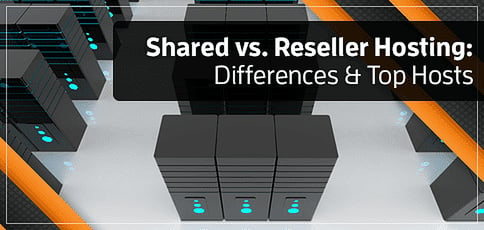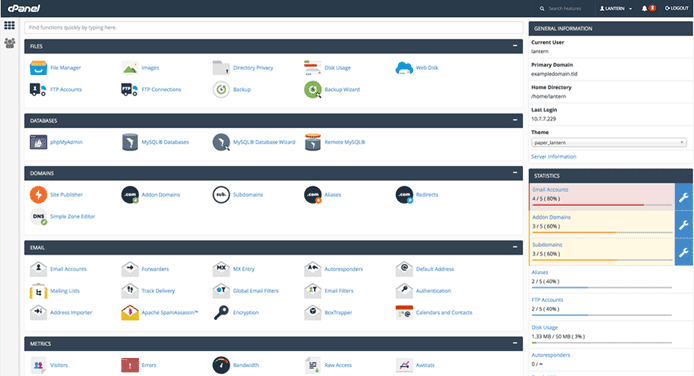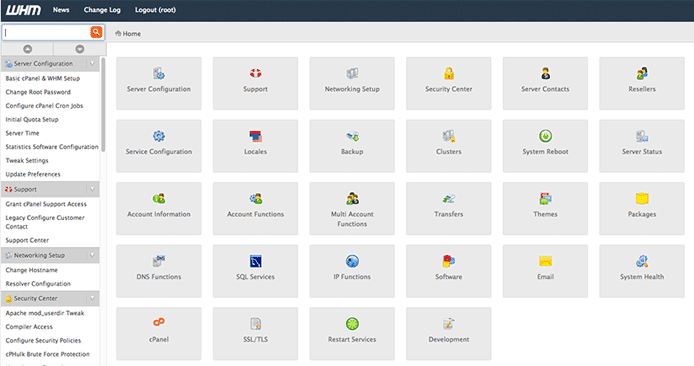
Shared vs. reseller hosting services can look surprisingly similar at first, as you’ve got one server being shared by multiple customers. However, reseller hosting enables you to take ownership of a larger slice of the computing resources and share the wealth with friends, family, or clients.
For those who always seem to get recruited to help folks start a website, make a little extra money on the side, or those looking to start a web hosting business, reseller is the way to go. Shared hosting, on the other hand, roughly follows a “one account, one site” approach with much more limited resources.
Rather than signing up friends and clients for shared hosting accounts billed by a plethora of providers, consider becoming a hosting reseller and managing each of the accounts yourself. More money for you, less headache for them — everybody wins! Deciding between shared or reseller hosting can get confusing, though, so let’s go over the key differences.
Shared Hosting vs. Reseller Hosting – Top Hosts for Each
Before diving into the nitty-gritty details of how shared and reseller hosting differ, let’s take a 30,000-foot view at the best hosting providers for each configuration. You can quickly notice some major differences right off the bat, such as cost and prominent features.
3 Best Shared Hosting Services
We’ve reviewed tons of shared hosting providers, both personally and in our day jobs at HostingAdvice.com. We advise prospective shared hosting customers to look for free domains, easy site-building options, and marketing incentives. And don’t underestimate the significance of support ratings and uptime guarantees! Without further ado, check out the top shared hosts:
1. InMotionHosting.com
- High-quality hosting, no matter the format
- FREE SSD storage packs 20x the performance
- FREE SSL certificate and 24/7 support
- 1-click installs for WordPress and popular CMSes
- Get started with FREE website transfer service
- Get started on InMotion Hosting now.
SHARED
RATING
★★★★★
Our Review
InMotion Hosting offers an excellent business-class shared hosting plan — with a price tag lower than several other budget hosts. For the IT crowd in the audience, you’ll appreciate SSH access, as well as support for PHP, Ruby, Perl, Python, WP-CLI, and other popular languages. Go to full review »
| Money Back Guarantee | Disk Space | Domain Name | Setup Time |
|---|---|---|---|
| 90 days | 100 GB SSD - Unlimited SSD | FREE (1 year) | 5 minutes |
2. HostGator.com
- Get 74% off monthly pricing
- A perfect blend of price and performance
- Intuitive control panel with 1-click CMS installs
- Unlimited everything — from domains to databases
- Around-the-clock expert support
- Get started on HostGator now.
SHARED
RATING
★★★★★
Our Review
HostGator is a great compromise between performance and price. The company offers unlimited emails, MySQL databases, disk space, and bandwidth, plus one-click installs of popular open-source projects, in addition to a 99. Go to full review »
| Money Back Guarantee | Disk Space | Domain Name | Setup Time |
|---|---|---|---|
| 30 days | 10 GB SSD - 40 GB SSD | FREE (1 year) | 4 minutes |
3. SiteGround.com
- FREE CDN, email, and daily backups
- Hassle-free website and email migrations
- Unlimited traffic, databases, and email
- Industry-leading customer support response times
- HostingAdvice readers get 86% off
- Get started on SiteGround now.
SHARED
RATING
★★★★★
Our Review
Providing hosting with the perfect balance of technological innovation and superior customer support, SiteGround offers a range of affordable hosting services to meet your needs. In addition to the expected cheap web hosting perks — a free website builder and unlimited bandwidth — the company specializes in custom-built tools to deliver strong and positive user experiences. Go to full review »
| Money Back Guarantee | Disk Space | Domain Name | Setup Time |
|---|---|---|---|
| 30 days | 10 GB SSD - 40 GB SSD | New or Transfer | 6 minutes |
See more shared hosting plans »
3 Best Reseller Hosting Services
As we move along to the top reseller hosting providers, you may notice some familiar faces. We’ve found the best hosts overall boast a myriad of services, included shared, reseller, managed, and application-specific hosting.
As we conducted our comprehensive reviews, we assessed pricing, storage, management options, and monitoring features, as well as the reliability factor we emphasized for shared hosting customers. You can trust the hosts below to help you launch your own web hosting biz:
1. InMotionHosting.com
- SSD reseller hosting with FREE cPanel/WHM
- Keep your reseller business organized with WHMCS
- FREE dedicated IP and site backups
- Tons of email features with IMAP and POP3 support
- Manage your domains with a FREE Enom license
- Get started on InMotion Hosting now.
RESELLER
RATING
★★★★★
Our Review
InMotion Hosting offers cPanel reseller hosting that’s affordable, easy to manage, and includes free SSDs. Become a domain reseller for popular gTLDs and TLDs with a free Enom license and WHMCS to manage your accounts. Go to full review »
| Money Back Guarantee | Disk Space | Domain Name | Setup Time |
|---|---|---|---|
| 90 days | 80 GB SSD - 260 GB SSD | FREE (1 year) | 5 minutes |
2. InterServer.net
- Set up unlimited cPanel accounts for your clients
- FREE proactive daily backups and no setup fee
- Private DNS servers and dedicated IP address
- Clients enjoys all standard shared hosting features
- Client management through WHM control panel
- Get started on InterServer now.
RESELLER
RATING
★★★★★
Our Review
InterServer automatically connects your customers to the company’s full roster of shared hosting perks, including high-performance SSDs, a website builder, free migration, and Intershield security. Enjoy instant account setup and easy management on premium hardware. Go to full review »
| Money Back Guarantee | Disk Space | Domain Name | Setup Time |
|---|---|---|---|
| 30 days | 80 GB SSD - 280 GB SSD | New or Transfer | 4 minutes |
3. SiteGround.com
- Discounted plans for different workflows
- Ultra-reliable cloud hosting infrastructure
- FREE site transfers and WordPress migrator plugin
- Unlimited MySQL databases and bandwidth
- White-label client management and private DNS
- Get started on SiteGround now.
RESELLER
RATING
★★★★★
Our Review
You’ll be hard-pressed to find a more affordable reseller plan that comes with better hardware than SiteGround. The web host carries a stellar reputation for customer service and cloud-based scalability. Go to full review »
| Money Back Guarantee | Disk Space | Domain Name | Setup Time |
|---|---|---|---|
| 30 days | 10 GB SSD - 40 GB SSD | New or Transfer | 6 minutes |
See more reseller hosting plans »
Shared vs. Reseller Hosting: Who Uses Each
Shared hosting is ideal for individuals and business owners who simply need a means of getting their website online. Your host is in control of what resources are allocated to you, and you focus on your site design, email setup, and domain management.
Reseller hosting is great for freelance developers who want to host multiple client sites, serial startup owners who anticipate launching various projects, and/or technical entrepreneurs who want to take on web hosting as their next business venture. Once you purchase a select amount of bandwidth and server resources from a host, you can reallocate those resources to other clients or websites as you see fit. You get greater control over server settings and domains, and you get the added benefits of billing tools since you’re essentially running your own hosting business by reselling your host’s services.
Shared vs. Reseller Hosting: cPanel / WHM Control
Both shared and reseller hosting customers are typically given some sort of management panel. Typically, end users get cPanel (shared hosting), and resellers get WHM (reseller hosting).

Most reputable web hosting providers will include a cPanel license in shared hosting plans.
A web hosting control panel, like cPanel, gives users access to management options for domains, email, FTP, SSH users/keys, databases, and backups, as well as some sort of application that lets you download and install other software such as WordPress or Magento.
The majority of hosts will offer a free cPanel license with shared hosting accounts, and this is more than enough to satisfy the typical shared hosting customer. Other popular control panels include Plesk, Webmin, and ISPmanager.

Reseller hosting customers can use cPanel & WHM to manage multiple accounts from one console.
Reseller hosting users get an upgraded flavor of cPanel: cPanel & WHM. The latter part of the name is short for Web Host Manager, and it functions as the billing and hosting account management portal for your hosting business. You can create, change, and manage reseller accounts and admin permissions; set up server alerts; assign custom features to or upgrade or downgrade specific hosting accounts; park domain names; generate and install SSL certificates; and limit bandwidth usage by your clients, among other capabilities.
Shared vs. Reseller Hosting: Number of Sites
For the most part, shared hosting users can host one website on a basic plan. Some hosts, such as InMotion, will allow you to host unlimited websites on a single account. Others will allow it, but at a premium rate, and some limit one website per account.
In case it wasn’t obvious, reseller hosting users can host more than one site. For the most part, you can reallocate resources however you see fit, so long as you don’t cause issues for your host such as I/O or CPU bottlenecking.
Resellers get the added perks of personal nameservers, which streamline the management intricacies of hosting multiple websites. A nameserver is a computer that translates domain names into IP addresses and vice versa. Without nameservers, you’d have to type in a 10-digit code to reach your favorite website. Domain names are much more memorable, and nameservers allow us to use them to navigate the web. Personal nameservers give you greater control over your domain and your clients’ domain names, which can become associated with your main domain, simplifying management a whole bunch.
Shared vs. Reseller Hosting: Performance / Security
Shared hosting comes with a central risk and reward. You’re sharing server resources, including bandwidth, storage, RAM — and the responsibility of all of your server neighbors’ sites. If one of their sites becomes compromised, your site is susceptible to the same fate.
That being said, shared hosting means there is a finite number of resources available to be dispersed between customers. Although shared hosts often promise unlimited or unmetered resources, that’s not technically true. Those hosts know, however, that most shared server customers won’t come anywhere near those limits, so it’s a nice marketing ploy. When you do start to outgrow the shared hosting environment, the best hosts are great about welcoming you into the worlds of VPS and dedicated hosting options.
Although shared hosting provides more than enough performance for the average site owner, and it is inherently safe, folks looking to host multiple websites would probably do better with a reseller hosting plan.
Shared vs. Reseller Hosting: Price
It should come as no surprise that the added server resources, control, and business opportunities that come with reseller hosting bump the price up a notch or two from the shared hosting ballpark. Shared hosting typically costs $2 to $5 per month — an impressively affordable rate given the number of features and amount of resources you can use for your site.
Because reseller hosting comes with the power to house and manage several websites on an upgraded server, it’s understandably more expensive. Reseller plans typically start around $15 to $20 per month. That being said, don’t forget that you can likely offset that cost by your monthly profits as a reseller of hosting services.
Is Shared or Reseller Web Hosting the Better Call for Your Project?
As is the case when purchasing any other hosting type, the decision to sign up for shared or reseller hosting entirely depends on how you intend to use it and how much control you require.
If it’s just you, your website, and your business, shared hosting will more than suffice. If you’re planning on running multiple sites, or if you have the fate of multiple businesses in your hands as a freelancer, reseller hosting is a worthwhile route to explore. Whichever path you choose, I hope it’s laden with growth and revenue opportunities — because no one takes the time to build an online business to be paid in hugs and happy thoughts, right?
HostingAdvice.com is a free online resource that offers valuable content and comparison services to users. To keep this resource 100% free, we receive compensation from many of the offers listed on the site. Along with key review factors, this compensation may impact how and where products appear across the site (including, for example, the order in which they appear). HostingAdvice.com does not include the entire universe of available offers. Editorial opinions expressed on the site are strictly our own and are not provided, endorsed, or approved by advertisers.
Our site is committed to publishing independent, accurate content guided by strict editorial guidelines. Before articles and reviews are published on our site, they undergo a thorough review process performed by a team of independent editors and subject-matter experts to ensure the content’s accuracy, timeliness, and impartiality. Our editorial team is separate and independent of our site’s advertisers, and the opinions they express on our site are their own. To read more about our team members and their editorial backgrounds, please visit our site’s About page.









